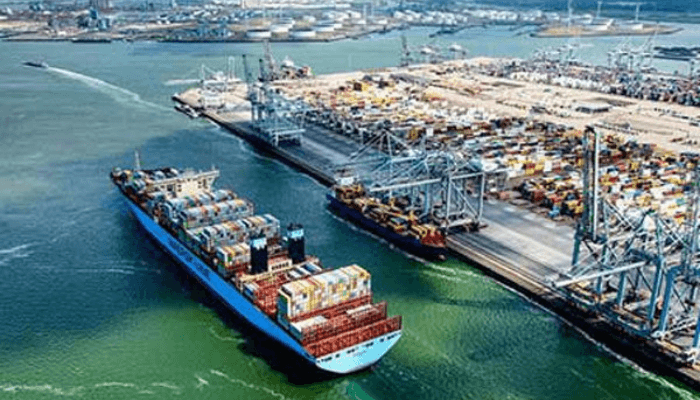Maritime stakeholders have lamented the absence of a functional National Shipping Line (NSL), in Nigeria, saying without a strong national shipping carrier, Nigeria is at the mercy of foreign shipping companies, paying exorbitant rates for the transportation of our goods.
In a statement, on Tuesday, titled, ‘Nigeria @ 64: A Lament For Lost Opportunities, Collapse Of Indigenous Shipping, the chief executive officer, Ships & Ports Communication, Dr Bolaji Akinola, stated that foreign-owned vessels dominate Nigeria’s coastal waters, extract profit from the nation’s resources while indigenous players remain passive spectators.
He, however, lamented that Nigeria shipping failure started post-independence when Nigerian National Shipping Line (NNSL), bequeathed to the nation by the colonial administration was thoroughly mismanaged and run aground.
According to Dr Akinola, Nigeria’s presence in the global shipping industry remains negligible, saying the Federal Government’s approach to the development of indigenous shipping has been lackadaisical.
“As Nigeria marks 64 years of independence, one of the most glaring failures of our postcolonial governance is the tragic collapse of our indigenous shipping industry. The Nigerian National Shipping Line (NNSL), bequeathed to us by the colonial administration as a robust national shipping carrier, once stood as a symbol of pride, sovereignty, and economic promise.
“Yet, within just two and a half decades after independence, the NNSL was thoroughly mismanaged and run aground, becoming a reflection of the broader dysfunction that has plagued our maritime sector.
“At the time of independence in 1960, Nigeria inherited a fleet of ships that were not only operational but positioned to support our emerging economy. The NNSL was a testament to the vision of building a self-sufficient maritime power capable of transporting goods and commodities both in and out of our bustling seaports.
“But today, 64 years later, we find ourselves in a pitiful state, where no Nigerian shipping company owns even a single vessel among the over 5,000 ships that call at our ports annually. These ships, owned by foreign interests, dominate our waters, enriching their nations while we sit idly by, exporting oil, gas, and agricultural produce, and importing manufactured goods without a stake in the process,” he stated.
He argued that the collapse of the nation’s shipping sector wasn’t due to lack of potential or resources, but rather a systematic and pervasive failure of leadership and vision.
Also, according to Dr Akinola, successive governments failed to invest in the revival of the collapsed shipping line or even establish policies that could encourage the growth of indigenous companies capable of competing in the international shipping arena.
“The sad reality is that despite NIMASA’s vast resources and regulatory power, Nigeria’s presence in the global shipping industry remains negligible. Worse still, the Federal Government’s approach to the development of indigenous shipping has been nothing short of lackadaisical.
“Successive administrations have paid lip service to the need for a vibrant national shipping industry, but their actions have demonstrated a complete disregard for the sector’s strategic importance. The national shipping line was allowed to decay, with successive governments failing to invest in its revival or even establish policies that could encourage the growth of indigenous companies capable of competing in the international shipping arena.”
Dr Akinola further lamented that currently no Nigerian shipping company owns a single vessel among the over 5,000 ships that call at the nation’s seaports annually.
“The Nigerian government seems content to allow foreign-owned vessels to dominate our waters, extracting profit from our resources while we remain passive spectators.
“The negative impact of this failure is far-reaching. Without a strong national shipping carrier, Nigeria is at the mercy of foreign shipping companies, paying exorbitant rates for the transportation of our goods. This erodes our trade balance, weakens our economic independence, and limits job creation in a sector that could employ tens of thousands of Nigerians.
Moreover, the absence of a robust maritime industry stifles our ability to leverage the blue economy, a sector that could potentially contribute billions to our GDP if properly harnessed.”
The Ships & Ports boss, advised that the way forward for the government to develop the sector was a strategic plan that includes investment in shipbuilding infrastructure, access to credit for Nigerian ship owners, and policy frameworks that promote local participation in international trade.
“As we reflect on this tragic decline, the question must be asked: what is the way forward? First, the government must get serious about developing indigenous shipping. This requires more than the creation of ministries and agencies; it demands a focused, strategic plan that includes investment in shipbuilding infrastructure, access to credit for Nigerian ship owners, and policy frameworks that promote local participation in international trade. NIMASA must be refocused to fulfill its original mandate, not as a revenue-generating agency but as a true promoter of Nigerian shipping interests.
“We must also recognise the strategic importance of having our own national shipping carriers. It is inconceivable that a country with the economic potential of Nigeria remains without its own fleet of vessels. Participation in the movement of international trade is not just about economic gain—it is about sovereignty, security, and our standing in the global maritime community.”
“The time for complacency is over. The federal government must act now to revive the dream of an indigenous shipping industry. Our future prosperity depends on it. The failure to do so will only deepen Nigeria’s reliance on foreign powers, continuing the cycle of dependency and lost opportunities that has plagued our maritime sector for far too long,” he stated.





